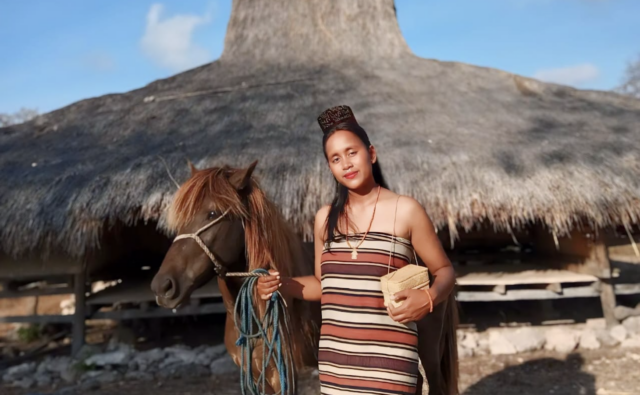
Climate Justice | February 13, 2025
Aryani Newa’s Climate Action in Villages, Beaches, and Social Media
Alfa Gumilang

Aryani Newa Humba is her full name, given to her by her grandmother. It means a girl born in Sumba who is simple and tough. She was born and raised in Mondu Village, East Sumba, East Nusa Tenggara. It is one of the provinces in Eastern Indonesia.
Her simplicity and toughness are evident in her Instagram posts. Her Instagram posts are concise, without long captions. Each upload features concise descriptions, but the variety of photos is striking. If you want to see for yourself, check out her account, @aryannhumba.
“I don’t know how to use fancy words, but the photos speak for themselves,” she said.
Many of her photos include small children aged 5 to 10 years, both in classrooms and at the beach. Aryani mentioned that these children are part of a Sunday School group at her church. She teaches them about climate change and ways to address it.
Her lessons extend beyond theory, involving practical activities that children can easily participate in. In three months, she has taken the children to Purukambera Beach, not far from her village, once or twice a month. There, they learn, play, and participate in cleaning up plastic waste scattered along the shore. This initiative fosters a sense of environmental responsibility from a young age.
“Every month, we regularly clean up plastic waste on the beach with our young friends from the village,” she explained.
During one beach clean-up, they collected five sacks of plastic waste. Aryani and her friends have been doing this for a long time, and she is beginning to notice a positive impact. The amount of plastic waste on the beach is not as overwhelming as it once was. She believes that their actions may gradually encourage visitors to become more mindful about littering.
“Hopefully, people will start to feel embarrassed to litter because we are the ones who consistently clean up after them,” she stated confidently.
***
The distance from the beach to the village is less than one kilometer. Aryani demonstrates resilience in her village through simple actions that the local community can easily implement.
She was appointed as the Chairperson of the Luri Panamu Farmers Group, which translates to living in love with one another. The group consists of 15 women and 10 men, all of whom are married. Remarkably, the group is led by Aryani, a 23-year-old woman.
The farmer group was established only a year ago and cultivates crops such as water spinach, mustard greens, pak choi, and shallots across 1.5 hectares of agricultural land. Some work is done collectively, while other tasks are completed individually, depending on the type of crop and the workload. The results have been promising, increasing household incomes and providing additional funds for their children’s education.
Traditionally, agricultural land in Sumba is primarily planted with corn. However, due to increasingly unpredictable weather, corn cultivation has become unreliable. The community must adapt to these changing conditions, which led the Luri Panamu Farmers Group to innovate by planting alternative food crops. This shift has helped residents reduce their dependency on a single type of food.
“With uncertain weather conditions and irregular rainfall, we seek alternative food sources. We can finally produce a variety of foods instead of relying solely on corn,” Aryani stated.
The farmer group employs traditional farming methods, avoiding the use of chemical fertilizers. “We use dead leaves mixed with ordinary soil or animal manure. This approach comes from the teachings of our ancestors,” she added.
Indigenous peoples are known for their resilience, and their close connection to nature has provided them with extensive knowledge for managing land. This knowledge has been passed down through generations and remains relevant despite modernization. It is particularly valuable in responding to the changes induced by the climate crisis, allowing Indigenous communities to adapt effectively to natural conditions.
However, modernization has also influenced younger generations, leading many to believe that respectable jobs are only found in offices, reducing their interest in farming. This mindset presents a challenge for Aryani, who is determined to inspire young people to pursue farming. She believes that they need motivation and tangible examples to view farming as a viable profession and to take care of the earth.
“I want to invite young people to farm by showing them that it can be a respectable job,” she said.
Her Instagram account features various activities, showcasing Aryani’s commitment to her work. The photos and videos she uploads provide real examples of her efforts, illustrating that she is not just all talk.
***
The knowledge and actions of Aryani are deeply connected to the role of the Coordinating Foundation for the Study and Management of Natural Resources (Koppesda), which is part of the Adaptation Coalition (VCA Partners). It is within this organization that Aryani’s resilience has been developed. She has gained various insights into climate change and has worked tirelessly to explore solutions to the climate crisis. There is a wealth of local knowledge, particularly wisdom passed down from Indigenous Peoples.
Despite Aryani’s remarkable resilience, raising awareness and promoting climate action within the community is no easy task. This work needs to be expanded and will have a greater impact if done collectively. As one of the local champions supported by Koppesda and the Adaptation Coalition, Aryani continues her efforts to inspire more people with the same motivation in Sumba

